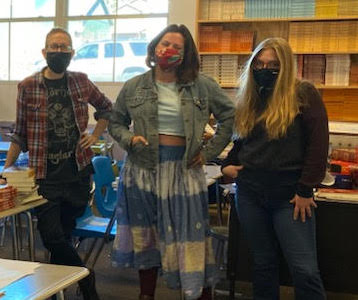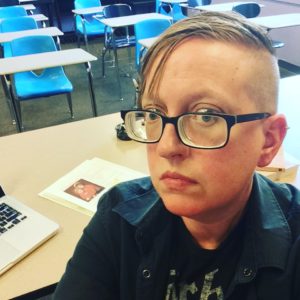
When Sarah and I talked about places to live, if not Flagstaff (we loved Flag, but were reluctant to fully commit), I, naturally, wanted to return to Chicago—to green, to Lake Michigan, heavy thunderstorms, brutally cold winters, my sister, my parents, so many friends and extended family.
Sarah always proposed Tucson, her hometown. (Funny how we’re partial to where we come from, no matter our complicated feelings about it—trust me, I have complicated feelings about Chicago). I always nixed Tucson, arguing, “I couldn’t stand the heat.”
Sarah would agree: “You would be too hot.”
Sarah wouldn’t like the cold of Chicago’s winters, but she’d lived in cold climates before. Flagstaff was the furthest west of the Mississippi I’ve ever lived (by about 2,000 miles). Where I’m from you can’t just drive to another part of the state to “be warm” or “see snow.” In February, in Illinois, you cannot drive from Chicago to Springfield (to the south) for “warmth.” The Midwest doesn’t work that way. So even though I live in Arizona, I’ve never lived in (nor wanted to) “hot Arizona.” I preferred “temperate/sometimes downright cold Arizona.”
My wife is half Greek. Her DNA is made for warm climates. I’m some kind of English-Irish-French-German peasant mutt that is programmed for cold, clammy, overcast days working the fields.
And here we are. November 2020, and today is Thanksgiving. Thanksgiving, politically, is problematic, but for me it was always a day for coming together with the people I most loved and gorging on indulgent foods I could not justify eating at any other point in this year. In fact, the past few years, my wife and I have hosted little Thanksgiving dinners for any friends without a place to eat a meal (and yes, I cooked it all and loved every minute), but I am not cooking this year: Tomorrow, we move to Tucson.
The last time I moved: Chicago’s Midway to Phoenix’s Sky Harbor via one-way Southwest flight, and up the mountain to Flagstaff, in a shuttle bus in a snowstorm, on Dec. 31, 2014. I had pared down my belongings to two giant suitcases which I leaned against in the Amtrak station, just after midnight, waiting for a cab. (I left Bernie with my parents and went back for him later.) I was still in my 30s. Still had a good couple years of mileage left on that weird, brutal, wonderful decade of my life. I moved for love.
The move before the last: Chicago to Milwaukee, via 1998 red Chevy Cavalier, followed by a moving truck full of my furniture. The I-94, to the 294, I think. I get my expressways confused. I had turned 34 that summer. A month after I moved, I would find out I had stage II breast cancer (just can’t keep cancer out of it, can I?). My apartment overlooked Lake Michigan. I could hear the barges at night. I moved there for a job.
I think, in most cases, moving for love is better than moving for a job. Even if the love or the job don’t last forever (so few things do), a movement in the direction of love can only ever be good.
The move I will make tomorrow: Flagstaff to Tucson via one UHaul, one 2014 Honda Fit. The I-17 to I-10 E. I am 44. Married. A dog named Abe. A few cats. Bernie is dead. I still miss him. The cancer I was treated for in Milwaukee is back and in my bones. As of my last scan (three weeks ago) it is managing to stay out of my lungs, liver, etc. Nevertheless, we are moving for healthcare. I love my job in Flagstaff, but I have big(ger) city health problems that need big(ger) city healthcare. Plus, Sarah’s family is there.
I will finish out my contract year with FALA—even if we go back in person this year (miracles occur), I will drive up and teach. Anyone who’s ever read my contribution to this series will know that I love being an educator and my students are my world.
The decision to leave Flagstaff was hardly easy.
Has any decision in 2020, for any of us, been easy?
Change, even good change, is often deeply painful. Change almost always begets goodbyes. This year has been full of so many goodbyes—for every single American. And then on top of our “American goodbyes,” we’ve had our own personal, private goodbyes to struggle with. And this year, the meeting of the personal and political has been particularly agonizing.
As readers of my installments know, this year has involved a lot of change for me, personally. Mostly on the health front. And it was during an agonizing moment, several weeks ago, that I realized my wife and I had to leave Flagstaff.
I was sitting, waiting to have my blood drawn after a morning in which I’d been given the wrong time for a scan. Basically, I was having the kind of day where I was dealing with the typical, stress filled nonsense from the same healthcare system (to be unnamed) that I’ve been dealing with since I first found a bump on my back last November. In re: what I mean by “typical nonsense”—I found a tumor on my back in November, saw my doctor days later, did not get my biopsy results until January; my biopsy results, revealing that my breast cancer was back, were delivered to me via the “patient portal” messaging system. I’m not trying to burn bridges or avenge anything, but the American healthcare system can and should do better by its patients. (Just as I’ve been ranting that the American education system can and should do better by its students.)
The problem is that we have to see people as people and not dollars. Or statistics. Or test scores. Or lab results.
Anyway. I had a sort of epiphany. Someone was talking to me. I say it was Kenny Rogers because I don’t really believe in God and “move to Tucson” seemed like the kind of advice Kenny Rogers would give backstage in the ‘70s while stoned out of his gourd and still in his sequined cowboy jumpsuit. (And one ought heed Kenny Rogers—after all, he wrote “The Gambler.”)
Kenny Rogers or God or pick-your-deity said to me, “If you don’t get out of northern Arizona, the healthcare system is going to ruin your sanity or literally kill you.”
I sometimes call this a “gut feeling.” My gut feelings have seldom led me astray. Sometimes my gut feelings have led me to difficult truths, but never have they really led me to do something that was wrong. I mean, I didn’t want to leave Chicago. It was like trying to get a cat into a bathtub to get me to go to Milwaukee, but I needed the money. I needed the health insurance more than I knew: Because of the health insurance I got from the job in Milwaukee, I am still alive today.
I hope that someday I get to write the same words about Tucson.
I am trying to save my life. Flagstaff saved my life.
I didn’t know I needed this place until I had stayed for a little while. Honestly, if it wasn’t for Flagstaff Arts & Leadership Academy and the people—students, parents, colleagues—that I’ve had the honor to know there, we would have been back in Chicago years ago.
Maybe that would have been the wrong thing. Frankly, I know it would have been the wrong thing. There is not a day of my life in Flagstaff that I regret.
Last week, a few of my former students (now grown—one even engaged to be married) gathered in my classroom “just in case” I don’t get back to it. We read some poems, told some stories, laughed, cried, and I told them, “You have been part of my life’s greatest adventure.” Then I corrected, “You have been my life’s greatest adventure.”
None of us knows how long we have, but if I’m being real (and if you, dear reader, are being real) I’m probably not going to live a long, long life.
That’s okay. I’ve accepted this.
I’ll take every year I can get, but I’m not banking on 70, much less 80. (I’m not completely afraid of death—like most things, I’m fairly sure that with death, “the thought is worse than the deed.”) But I want as much life as I can have. I like this life. I want to teach in a classroom again. I want to be in less pain—physical and psychological. I want my appointments scheduled properly. I want callbacks. I don’t want to fight for test results. I want more time with those I love and less time doing the old world’s busywork.
So I’ll take my chances on Tucson. Let’s see if a bigger city, some sunshine, a lower altitude can do better by my body.
Nevertheless, I have loved you so, Flagstaff. Your seasons, your skies, but mostly your people—generous eccentrics, unsung artistic geniuses, wonderful weirdos. The outpouring of generosity and kindness and love, especially after my cancer diagnosis, was more than I ever expected, more than I’ve ever known from any community in which I’ve ever lived. In terms of community heart and soul, you really outdid yourself, Flagstaff. I will never know community support like that. Of this I am certain.
Of another thing I am certain: Flagstaff, your kids are more than alright. They are the reason I stayed. Moved for my wife, stayed for the kids.
The young people are what hooked and kept me in Flagstaff. I never wanted children of my own (that always feels like such an old folksy thing to say), but in the course of about seven years, I had hundreds of children—kids, teens, young adults (whatever you want to call them)—that have felt as close as I can possibly imagine to my very own. “My kids,” I’ll say to a doctor or nurse or tech. They’ll think I mean “mine” and I’ll have to clarify: “students.”
“Just students.” But they’ve been more than that to me.
I remember a lockdown drill. I was with a small group of seniors. We were all following protocol. I was on the floor, in the dark, my back against the classroom door. The kids strategically staggered against the walls, quiet and seated. Everyone always looks sort of terrified during these drills—even though we know they’re practice, they’re traumatic. I remember looking around the room, at their faces, I could name them all (but won’t here). And I thought to myself, “Would you take a bullet? Really and truly take a bullet for these kids?”
And my heart answered, resoundingly, “Yes.”
“Yes.” Because I am older and they are young.
“Yes.” Because, whether they would admit or not, they trust I will protect them.
“Yes.” Because the show must go on. Life must go on.
“Yes.” Because love and duty and righteousness must prevail where it can.
The word “student” never has fully captured what I feel about the young people I educate and care for. I love them, but in a very particular way. Something akin, I suppose, to motherlove.
I bet they have a precise word for this in Germany. Maybe they have a word for this in Tucson.
Flagstaff, I’ll be back—if not to live, then to visit. I’m just settling in down the hill.

